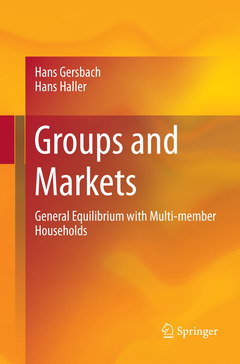Groups and Markets, Softcover reprint of the original 1st ed. 2017 General Equilibrium with Multi-member Households
Auteurs : Gersbach Hans, Haller Hans

This monograph studies multi-member households or, more generally, socio-economic groups from a purely theoretical perspective and within a general equilibrium framework, in contrast to a sizeable empirical literature. The approach is based on the belief that households, their composition, decisions and behavior within a competitive market economy deserve thorough examination. The authors set out to link the formation, composition, decision-making, and stability of households. They develop general equilibrium models of pure exchange economies in which households can have several, typically heterogeneous members and act as collective decision-making units on the one hand and as competitive market participants on the other hand. Moreover, the more advanced models combine traditional exchange (markets for commodities) and matching (markets for people or partners) and develop implications for welfare, social structures, and economic policy.
In the field of family economics, Hans Haller and Hans Gersbach have pioneered a ?market? approach that applies the tools of general equilibrium theory to the analysis of household behavior. This very interesting book presents an overview of their methods and results. This is an inspiring work.
Pierre-André Chiappori, Columbia University, USA
The sophisticated, insightful and challenging analysis presented in this book extends the theory of the multi-person household along an important but relatively neglected dimension, that of general equilibrium theory. It also challenges GE theorists themselves to follow Paul Samuelson in taking seriously the real attributes of that fundamental building block, the household, as a social group whose decisions may not satisfy the standard axioms of individual choice. This synthesis and extension of their earlier work by Gersbach and Haller will prove to be a seminal contribution in its field.
Ray Rees, LMU Munich, Germany
Part I: The Theme.- Introduction.- Social Groups.- Households.- Part II: The Basic Framework.- Pure Exchange with Fixed Household Structure.- General Equilibrium with Fixed Household Structure and Production.- General Equilibrium with Variable Household Structure.- General Equilibrium with Endogenous Household Structure.- Cores.- Part III: Other Forms of Group Formation.- Clubs, Matching, etc.- Related Work.- Part IV: Extensions and Applications.- Power in General Equilibrium.- Risk Sharing Capacity: Markets versus Households.- Inefficient Household Decisions.- Public Goods and Public Choice.- Economic Policy Analysis and Implications.
Date de parution : 05-2018
Ouvrage de 186 p.
15.5x23.5 cm
Date de parution : 08-2017
Ouvrage de 186 p.
15.5x23.5 cm
Disponible chez l'éditeur (délai d'approvisionnement : 15 jours).
Prix indicatif 105,49 €
Ajouter au panierThèmes de Groups and Markets :
Mots-clés :
Household decisions; Household behavior; Household formation; Collective decision making; Markets; General equilibrium; General equilibrium modeling; Socio-economic groups; Pure exchange economy; Allocation mechanisms; Welfare; Matching; Matching models; Club models; Economic policy; Social structure



